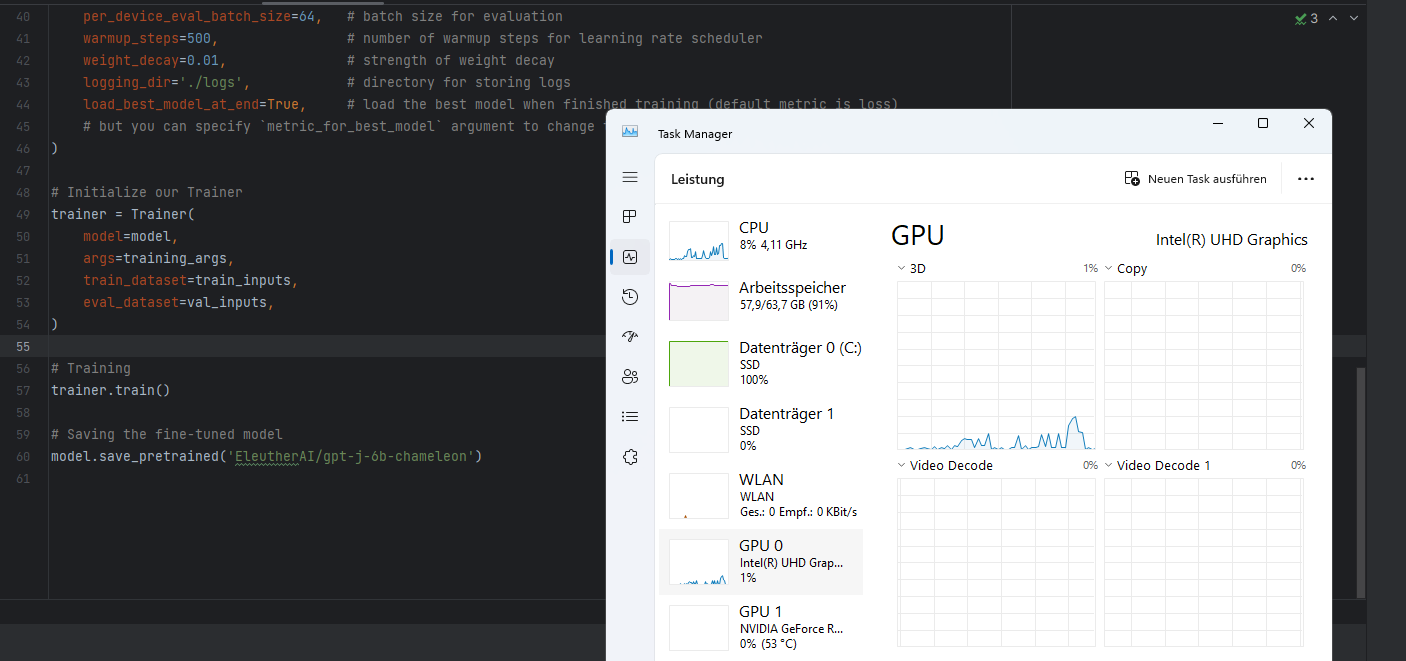The Trainer use actually the best chatgpt alternative model on huggingface. Here is the Training notice from Original Source:
This model was trained for 402 billion tokens over 383,500 steps on TPU v3-256 pod. It was trained as an autoregressive language model, using cross-entropy loss to maximize the likelihood of predicting the next token correctly.
https://huggingface.co/EleutherAI/gpt-j-6b#training-procedure
Dataset Links: https://d8devs.com/chameleon-base-and-chameleon-shop-datasets-20230530-1918/
import os
import pandas as pd
import torch
from sklearn.model_selection import train_test_split
from transformers import TrainingArguments, Trainer, AutoModelForCausalLM, AutoTokenizer
checkpoint = "EleutherAI/gpt-j-6b" # Model checkpoint updated
device = "cuda" if torch.cuda.is_available() else "cpu"
model = AutoModelForCausalLM.from_pretrained(checkpoint, trust_remote_code=True)
tokenizer = AutoTokenizer.from_pretrained(checkpoint, trust_remote_code=True)
if tokenizer.pad_token is None:
tokenizer.pad_token = tokenizer.eos_token
model = AutoModelForCausalLM.from_pretrained(checkpoint, trust_remote_code=True)
model.to(device)
# Load your data
data = pd.read_csv(os.getcwd() + 'chameleon_base_dataset20230530-1942.csv')
# Prepare your data
# You need to decide how to use your CSV data to create training examples for the model.
# For example, you might concatenate the 'description', 'code', and 'explanation' fields into a single string.
texts = data['description'] + ' ' + data['code'] + ' ' + data['explanation']
labels = data['classname']
# Tokenize your data
inputs = tokenizer(texts.tolist(), padding=True, truncation=True, max_length=512, return_tensors='pt')
inputs['labels'] = torch.tensor(labels.tolist()) # assuming labels are numerical
# Split data into training and validation sets
train_inputs, val_inputs, train_labels, val_labels = train_test_split(inputs, labels, test_size=0.2)
# Define training arguments
training_args = TrainingArguments(
output_dir='./results', # output directory
num_train_epochs=3, # total number of training epochs
per_device_train_batch_size=16, # batch size per device during training
per_device_eval_batch_size=64, # batch size for evaluation
warmup_steps=500, # number of warmup steps for learning rate scheduler
weight_decay=0.01, # strength of weight decay
logging_dir='./logs', # directory for storing logs
load_best_model_at_end=True, # load the best model when finished training (default metric is loss)
# but you can specify `metric_for_best_model` argument to change to accuracy, f1, etc.
)
# Initialize our Trainer
trainer = Trainer(
model=model,
args=training_args,
train_dataset=train_inputs,
eval_dataset=val_inputs,
)
# Training
trainer.train()
# Saving the fine-tuned model
model.save_pretrained('EleutherAI/gpt-j-6b-chameleon')
Views: 14
